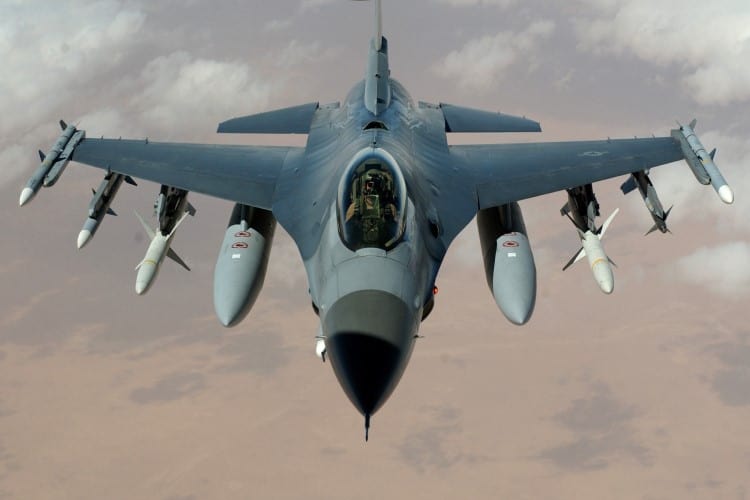This page contains affiliate links. This means if you a follow a link and make a purchase, at no additional cost to you, Humanitarian Careers will receive a commission. Thank you for supporting the site.
A humanitarian intervention is when military force is taken against a country, violating its sovereignty, with the aim to protect civilians and end human rights violations.
Humanitarian interventions have occurred throughout history. However, many recent attempts to end atrocities by use of military force have been unsuccessful… some even causing more conflict and bloodshed. As a result, people are beginning to question the role of humanitarian interventions.
In order to better understand if military force should be used to protect civilians in other countries, let’s explore the advantages and disadvantages of humanitarian interventions…
| Benefits of Humanitarian Intervention | Negatives of Humanitarian Intervention |
| Protects civilians | Rarely creates lasting peace |
| Allows humanitarian aid to be delivered | More lives can be lost |
| Ends human rights abuses | Expensive |
| Removes unjust regimes | Politically divisive |
| Deters future atrocities | Can have ulterior motive |
| Brings war criminal to justice | Historically been used selectively |
Protects Civilians
The first major benefit of humanitarian interventions is that they protect civilians.
The main aim of a humanitarian intervention is to use military force to stop human rights abuses and atrocities. The successful use of military force can prevent further harm coming to civilian populations. This is a significant argument in favour of humanitarian interventions.
When armed groups and governments use violence against non-military targets, it is a major human rights violation. Humanitarian interventions can stop attacks on civilians through destroying military hardware, limiting governments and armed groups abilities to carry out atrocities, or by removing unjust governments from power. Humanitarian interventions can also create a safe space for civilians to move away from fighting. These outcomes are all arguments in favour of humanitarian interventions.
There have been many examples of successful humanitarian interventions that have protected civilians. These include the NATO interventions in Kosovo in 1999, the Libyan No-Fly Zone in 2011 and the UN Peacekeeping mission in Eastern Democratic Republic of Congo. All of these are humanitarian interventions that protected civilians. They act as good examples of the benefits of humanitarian interventions.
Allows Humanitarian Aid to Be Delivered
Another significant argument in favour of humanitarian interventions is that they allow humanitarian aid to be delivered to people in need. When armed groups or governments are attacking civilians, or civilian populations are caught between warring factions, it can be impossible for aid to reach people. A benefit of humanitarian interventions is that they can drive-back armed forces and create safer areas for humanitarian relief.
When government and armed groups engage in conflict, often they actively prevent the delivery of humanitarian aid to civilian populations. This is a war crime. An argument in favour of humanitarian intervention is that using military force against armies and groups preventing humanitarian access can allow aid to be delivered to people.
Humanitarian interventions have in the past been used to allow people in need to receive humanitarian aid. An example is the US intervention in Somalia, 1992. Here the US fought warring factions with the aim to deliver aid to civilians.
As can be seen from the above example, a major benefit of humanitarian intervention that it can create a space where humanitarian assistance can be provided to civilians, whilst also preventing armies from preventing aid reaching people who need it.
Ends Human Rights Abuses
An advantage of humanitarian interventions is that they can put an end human rights abuses and stop atrocities. One of the main reasons given for humanitarian intervention is that without intervening militarily, governments and non-state armed groups can act with impunity when committing human rights violations against civilians.
Arguments are often made for humanitarian interventions when there are reports of extensive and wide-spread human rights abuses. By taking military action against the perpetrators, humanitarian interventions can end such atrocities. An argument in favour of humanitarian intervention is that without taking military action against governments and groups committing crimes against humanity, it could be impossible to stop them from continuing.
Most humanitarian interventions are justified by aiming to end human rights violations against civilians. Some examples of humanitarian interventions that have succeeded in doing this include the NATO intervention in Bosnia in 1992. As was the case in Bosnia, a strong argument in favour of humanitarian intervention is that it can be used to end human rights abuses.
Removes Unjust Regimes
An argument in favour of humanitarian interventions is that they remove unjust and repressive regimes from power. Often when military action is taken against a regime that oppresses its people humanitarian intervention is used as a justification.
There are many governments in the world that commit horrific human rights abuses against their own people. Humanitarian interventions can be used to remove these regimes with the idea to replace them with more democratic and inclusive governments.
A point that can be made in favour of humanitarian interventions is that without the use of military force, many oppressive regimes will continue to commit human rights abuses against their civilians. Often humanitarian interventions are the only action that can be taken to remove these regimes.
There are many examples throughout history of humanitarian interventions being used to unseat repressive governments. These include the 2003 invasion of Iraq. Although there is no guarantee that what replaces a dictatorial regime will be democracy, an argument in favour of humanitarian interventions is that they can be used to remove horrific governments from power.
Deters Future Atrocities
A major point in favour of humanitarian interventions is that they can deter governments and armed groups from committing atrocities in the future. Essentially, if a repressive regime or non-state armed group knows that if they commit extensive human rights abuses, the international community will intervene, this acts as a deterrence.
When a government or militia commits war crimes, genocide or crimes against humanity it can result in wide-spread calls to intervene. Previous successful humanitarian interventions can show human rights abusers that there are limits on their actions. Although this may not stop all attacks on civilians, even if it only partially acts as a deterrence, then that is a significant advantage of humanitarian intervention.
It can be hard to find concrete examples of when humanitarian interventions have acted as deterrence to governments and regimes. However, there is strong evidence that the failure of the US intervention in Somalia was a catalyst for the Rwandan genocide. This is because Rwandan armed groups believed the US or other countries would not intervene following the failure in Somalia.
Brings War Criminal to Justice
A final case that can be made for humanitarian intervention is that allows war criminals and human rights abuses to held to account.
An advantage of taking military action against regimes and groups that break international law is that it means their actions do not go un-punished. This is a good argument for humanitarian interventions as helps to prevent further atrocities whilst also bringing some justice to victims.
Although it is not always possible to bring the exact perpetrators of crimes to formal justice, humanitarian interventions set a precedent that attacks on civilians and breaches of human rights law will not go unpunished. It also acts as some way that regimes and groups that do carry out atrocities can be held accountable.
There have been some of examples of when humanitarian interventions have successfully held war criminals and human rights abusers to account. These include the NATO intervention in Bosnia that eventually brought Slobodan Milošević to trial in the International Criminal Court in The Hague. As can be seen from these examples, a strong argument in favour of humanitarian intervention is ensuring war criminals and those who attack civilians face justice.
Humanitarian Intervention Online Courses
If you want to learn more about humanitarian interventions, including the pros and cons, we highly recommend the online course International Humanitarian Law in Theory and Practice by Leiden University in the Netherlands. International Humanitarian Law is the legal foundation of humanitarian interventions and understanding its basic concepts is key to gaining an overview of the advantages and disadvantages of trying to end crimes against humanity. Click the link to enrol in the course.
Another online short course we highly recommend for those interested in humanitarian interventions is The Changing Global Order, also offered by Leiden University. This course looks at the major shifts in global affairs, including the use of military force against states committing atrocities. Follow the link to the course’s page for more information.
For those wanting to gain a better understand of the pros and cons of humanitarian intervention, we also recommend the online course An International Security Series: Genocide. Many people call for the use of military force to stop countries committing genocide. This online course shows the challenges in doing this and the international security context that surrounds humanitarian interventions. The link if to the course’s page.
Rarely Creates Lasting Peace
A major point that can be made against humanitarian interventions is that they have a historical record of not achieving lasting peace. Many humanitarian interventions are followed by an increase in violence. This can definitely be a negative result of military actions for humanitarian aims.
There are many complex reasons why humanitarian interventions often fail to create peace in the long-term. These include that they destabilise the country in which the military action is taken, a lack of proper planning following the intervention and systemic issues within the country that are not resolved by the removal of repressive regimes.
The lack of long-lasting stability and peace following many humanitarian interventions is a significant argument against them. If the aim of a military intervention into another country is to protect civilians and the lasting impact is further conflict, it calls into questions the benefits of humanitarian interventions.
There are sadly too many examples of humanitarian interventions resulting in more conflict or failing to achieve lasting peace. These include military interventions in the Libyan Civil War, which, although removing the horrific dictator Muammar Gaddafi, also resulted in an extensive civil war that is still ongoing. As can be seen, the failure of humanitarian interventions to end conflicts or secure stability is a strong negative point against them.
More Lives Can Be Lost
Another argument that can be made against humanitarian interventions is that by taking military action against those committing atrocities, actually more lives can be lost. Although the aim of a humanitarian intervention is to prevent further human rights abuses, in fact often military interventions in countries result in an increase in bloodshed.
There are many reasons why humanitarian interventions can result in further conflict. A prime reason is that as the foreign military force engages, often armed actors within the country turn to fend off the invading army. This can also mean disparate groups now band together to fight what they see as an aggression against their country.
Although humanitarian interventions aim to stop violence and atrocities, in fact they can increase them. This is a key point against them. Humanitarian interventions require using military force and this means more armed actors are involved and fighting must take place between the intervening forces and those they are trying to stop from committing atrocities.
Many humanitarian interventions can be used as examples to show how more lives can be lost when military force is used against repressive regimes and armed groups. A strong example is the US invasion of Iraq in 2003 that was justified as a humanitarian intervention but resulted in many years of bloodshed. A major argument against humanitarian interventions is that they can result in more deaths, not less.
Expensive
A case that can be made against humanitarian interventions is that they are hugely expensive for the country taking military action.
The use of military force anywhere in the world comes at huge financial cost. Modern military equipment costs many millions of dollars. This is combined with the need to keep armies, air forces and navies on stand-by and be able to project military force around the world. To be able to undertake a humanitarian intervention means massive amounts of money must be committed.
Simply put, many nations do not have, or wish to spend, the huge financial sums required to military intervene in another country. The huge cost of humanitarian interventions is an important point against them. Those who argue against humanitarian interventions also state that the funds could be better used to help people in need, such as in economic development or peace building initiatives.
Two humanitarian interventions that are renowned for their huge financial costs are the US interventions in Afghanistan and Iraq. In total, America has spent around 2.26 trillion USD in Afghanistan and 757.8 billion USD in Iraq. These huge sums of money, combined with the arguable lack of success in preventing continued conflict, make them good examples against humanitarian interventions.
Politically Divisive
A key argument that can be made against humanitarian interventions are that they can be politically divisive. To have a nation militarily violate the sovereignty of another country is controversial. Although many nations may support taking action to stop human rights abuses, not all countries will see the events from the same perspective.
Humanitarian interventions may aim to stop armed groups and oppressive governments from committing atrocities against civilians, however they are can be politically divisive. Often countries allied to regimes or armed groups committing human rights violations try and prevent humanitarian interventions, or they work to delegitimise or limit the success of intervening forces.
The lack of broad political support for humanitarian interventions is an important factor against them.
History is full of examples of humanitarian interventions that could not go ahead because of political division, such as with the US-UK action in the Syrian Civil War following chemical weapons attacks. Also, many military actions claimed as humanitarian interventions are denounced by political opponents as overt military aggressions. This includes western denunciations of Russia’s intervention in the Syrian Civil War.
Can Have Ulterior Motive
Many countries have used the pretence of humanitarian intervention before taking military action. The issue is that many times the use of military force has not actually been for to prevent human rights abuses, but that the pretence of humanitarian interventions has been given as a cover for aggressive military action.
An often-sighted argument against humanitarian interventions is that they are often used a cover by countries for military actions. As the UN charter specifically forbids countries from using armed force unless it is for self-defence or as humanitarian intervention, many countries use this as a way to legitimise and justify their acts of aggression.
It is often hard to examine when a country uses humanitarian interventions as a cover for military aggression as they will continue to sight their prevention of atrocities as a reason for their action. However, often there is wide spread agreement that the full motivation for the use of military force was aggression. An example of a time humanitarian intervention was used to justify aggressive military action is the US invasion of Iraq in 2003.
Historically Been Used Selectively
A final major argument against humanitarian interventions is that many times events that probably should have had military intervention to prevent have not received international action where-as other contexts have. The selective use of humanitarian interventions is a crucial part of why some people are against them.
Often, the international community will take military action to stop atrocities only when it can be done without extensive use of force or loss of life by the intervening country. Humanitarian interventions are also almost always used in cases where major world and regional powers can agree to the use of military force. Therefore, many atrocities go without international intervention.
An example of how humanitarian interventions have been used selectively is North Korea. Many people agree that the regime in Pyongyang is among the worst in the world. However, there has been no humanitarian intervention to stop the widespread abuses of human rights. This is because major nations such as China and Russia would prevent such as move and Western nations that might intervene do want to pay the heavy price of taking military action.
If you want to learn more about humanitarianism, explore our list of the top humanitarian online courses here.




